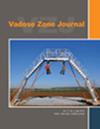Estimation of soil moisture using environmental covariates and machine learning algorithms in Cathedral Peak Catchment, South Africa
IF 2.8
3区 地球科学
Q3 ENVIRONMENTAL SCIENCES
引用次数: 0
Abstract
Abstract Soil moisture (SM) is a fundamental constituent of the terrestrial environment and the hydrological cycle. Owing to its significant influence on catchment hydrological responses, it can be utilized as an indicator of floods and droughts to aid early warning systems. This study aimed to develop a field‐scale method to estimate SM using parametric and machine learning‐based methods to compare whether advanced artificial intelligence methods can give similar results as traditional methods. Considering this, monthly observed SM data (from the top 10 cm), environmental covariates, and remotely sensed data from March 2019 to July 2021 for the Cathedral Peak Research Catchments VI and IX in South Africa were obtained. From the 241 observations obtained across 12 sites, 160 (∼66%) were used for model training, while the remaining 81 (∼34%) were used for model testing. Employing 10‐fold cross‐validation, the individual machine learning models (viz., support vector machine [SVM], random forest (RF), k‐nearest neighbor, classification and regression trees [Rpart], and generalized linear model) displayed a satisfactory performance ( R 2 = 0.52–0.79; root mean square error = 3.79–5.80). In the validation phase, the RF model displayed a superior performance, followed by the SVM. Subsequent SM estimation using the hybrid model produced satisfactory results in training ( R 2 = 0.90) and testing ( R 2 = 0.45). The results obtained from this study can aid in predicting SM variations in catchments with limited monitoring. Furthermore, this model can be applied in drought monitoring, forecasting, and informing agricultural management practices.使用环境协变量和机器学习算法估算南非大教堂峰流域土壤湿度
土壤水分是陆地环境和水循环的基本组成部分。由于它对流域水文反应有重大影响,因此可以用作洪水和干旱的指标,以帮助早期预警系统。本研究旨在开发一种现场尺度的方法,使用参数化和基于机器学习的方法来估计SM,以比较先进的人工智能方法是否能给出与传统方法相似的结果。考虑到这一点,我们获得了2019年3月至2021年7月南非大教堂峰研究集水区VI和IX的月度观测SM数据(从顶部10厘米)、环境协变量和遥感数据。从12个站点获得的241个观测值中,160个(~ 66%)用于模型训练,其余81个(~ 34%)用于模型测试。采用10倍交叉验证,单个机器学习模型(即支持向量机[SVM],随机森林(RF), k近邻,分类和回归树[Rpart]和广义线性模型)显示出令人满意的性能(r2 = 0.52-0.79;均方根误差= 3.79-5.80)。在验证阶段,射频模型表现出较好的性能,其次是支持向量机。随后使用混合模型进行的SM估计在训练(r2 = 0.90)和测试(r2 = 0.45)中获得了令人满意的结果。本研究的结果有助于在监测有限的情况下预测集水区的SM变化。此外,该模型可应用于干旱监测、预测和农业管理实践。
本文章由计算机程序翻译,如有差异,请以英文原文为准。
求助全文
约1分钟内获得全文
求助全文
来源期刊

Vadose Zone Journal
环境科学-环境科学
CiteScore
5.60
自引率
7.10%
发文量
61
审稿时长
3.8 months
期刊介绍:
Vadose Zone Journal is a unique publication outlet for interdisciplinary research and assessment of the vadose zone, the portion of the Critical Zone that comprises the Earth’s critical living surface down to groundwater. It is a peer-reviewed, international journal publishing reviews, original research, and special sections across a wide range of disciplines. Vadose Zone Journal reports fundamental and applied research from disciplinary and multidisciplinary investigations, including assessment and policy analyses, of the mostly unsaturated zone between the soil surface and the groundwater table. The goal is to disseminate information to facilitate science-based decision-making and sustainable management of the vadose zone. Examples of topic areas suitable for VZJ are variably saturated fluid flow, heat and solute transport in granular and fractured media, flow processes in the capillary fringe at or near the water table, water table management, regional and global climate change impacts on the vadose zone, carbon sequestration, design and performance of waste disposal facilities, long-term stewardship of contaminated sites in the vadose zone, biogeochemical transformation processes, microbial processes in shallow and deep formations, bioremediation, and the fate and transport of radionuclides, inorganic and organic chemicals, colloids, viruses, and microorganisms. Articles in VZJ also address yet-to-be-resolved issues, such as how to quantify heterogeneity of subsurface processes and properties, and how to couple physical, chemical, and biological processes across a range of spatial scales from the molecular to the global.
 求助内容:
求助内容: 应助结果提醒方式:
应助结果提醒方式:


